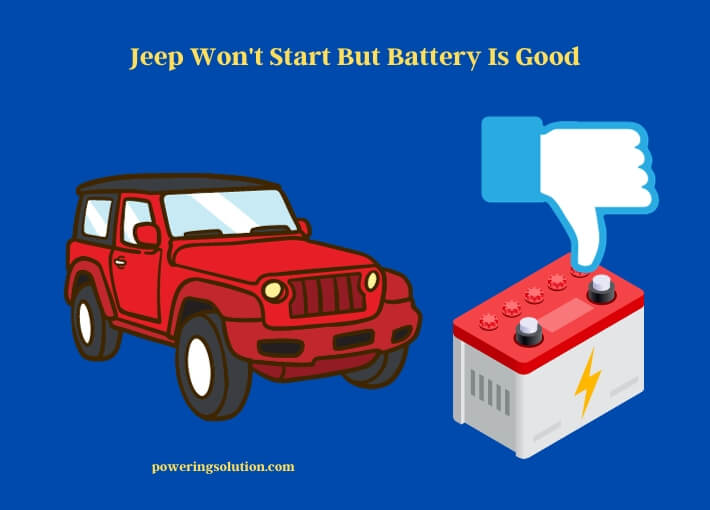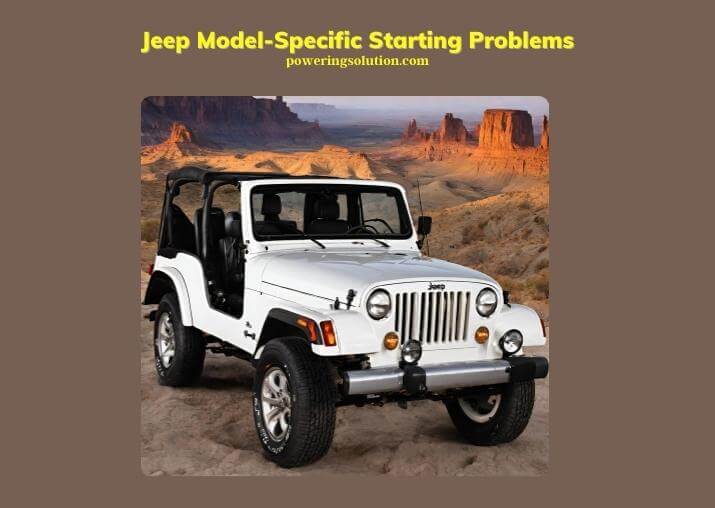If your Jeep won’t start but the battery is in good condition, it’s crucial to investigate other potential causes. This issue is common in models like the Jeep Grand Cherokee and can be perplexing, especially when the radio and lights are functioning normally.
Starting problems in Jeeps, including the Grand Cherokee and Wrangler, can stem from various sources beyond the battery. A key reason might be the starter motor. If your Jeep only emits a clicking sound when you try to start it, this is often a sign of a faulty starter. This issue is particularly prevalent in the Jeep Grand Cherokee. The starter motor is responsible for setting the engine in motion; if it fails, the engine won’t start despite a fully charged battery.

Electrical issues can also prevent a Jeep from starting. These problems might not affect the radio or lights, leading to confusion when the vehicle doesn’t start. In push-button start models like some Jeep Cherokees, a malfunction in the ignition system can prevent the engine from starting. This is different from traditional key ignition systems and requires a specific approach for troubleshooting.
Another aspect to consider is the condition of the brake system. In some cases, Jeeps won’t start if the brake is locked or not engaging properly. This is a safety feature to prevent the vehicle from starting under unsafe conditions.
For a more detailed analysis of why your Jeep won’t start even though the battery is good, covering models like the Wrangler and Cherokee, read the comprehensive article below. It provides in-depth insights into these issues and practical solutions to get your Jeep running smoothly again.
Jeep Won’t Start But Battery Is Good – Troubleshooting Guide
Common Reasons Why a Jeep Won’t Start Despite a Good Battery
Starter Motor Issues
You turn the key, and all you hear is a faint click. This frustrating scenario often points to a starter motor problem. The starter motor is like the heart of your Jeep’s starting process. When it fails, the engine won’t turn over, even if your battery is in top shape. Common signs of a failing starter include a clicking sound when turning the key, the engine not turning over, or intermittent starting issues. It’s not uncommon for starter motors to wear out, especially in vehicles that have seen a lot of miles.
Common Starter Motor Problems in Different Jeep Models
| Jeep Model | Starter Motor Issue | Frequency of Occurrence |
| Grand Cherokee | Solenoid Failure | High |
| Wrangler | Electrical Connection Issues | Moderate |
| Cherokee | Worn Out Gears | Low |
Electrical System Faults
Electrical gremlins can be tricky. They hide in your Jeep’s complex network of wires and connections, causing starting problems that are often mistaken for a dead battery. These issues can range from corroded connections and blown fuses to more serious wiring problems. Diagnosing these faults requires a keen eye and a bit of patience. It’s essential to check all connections, especially those leading to the starter motor and battery, for any signs of wear or corrosion.
Electrical Faults and Symptoms in Jeep Models
| Jeep Model | Electrical Fault | Symptoms |
| Grand Cherokee | Faulty Ignition Switch | No Start, No Dashboard Lights |
| Wrangler | Corroded Battery Terminals | Intermittent Starting |
| Renegade | Bad Ground Connection | Random Electrical Glitches |
Ignition System Challenges in Jeeps
Key Ignition Versus Push Button Start Systems
Jeeps come with different types of ignition systems: the traditional key ignition and the modern push-button start. Each has its unique challenges. Key ignition problems are often mechanical, such as a worn-out key or ignition cylinder. On the other hand, push-button systems, while convenient, rely heavily on electronics. A malfunction in the system, like a faulty brake pedal sensor in models like the Cherokee, can prevent the engine from starting. Understanding the type of system your Jeep has is crucial for troubleshooting.
Troubleshooting Ignition System Problems
Ignition system woes can leave you stranded. If your Jeep refuses to start, and you’ve ruled out the battery and starter motor, the ignition system should be your next suspect. Issues can range from a faulty ignition switch to a malfunctioning immobilizer system. A common symptom is the engine not cranking at all or the dashboard lights flickering. Regular maintenance and timely replacement of worn-out components can save you from these headaches.
The Role of the Fuel System in Jeep Start-Up Issues
Fuel Pump and Fuel Filter Problems
Let’s talk about fuel. Your Jeep needs a steady flow of it to start and run smoothly. Problems with the fuel pump or filter can starve your engine of this vital resource. Symptoms of a failing fuel pump include a whining noise from the fuel tank, difficulty starting, and engine sputtering. The fuel filter, if clogged, can also hinder the flow of fuel to the engine. Regular checks and replacements of these components are key to a healthy fuel system.
Symptoms of Fuel System Malfunctions
Identifying fuel system issues can be straightforward. If your Jeep cranks but doesn’t start, it might be a sign of a fuel delivery problem. Other indicators include a loss of power while accelerating, poor fuel economy, and the engine misfiring. These symptoms can often be traced back to either the fuel pump or the filter. Keeping an eye on these can prevent you from being left with a Jeep that won’t start.
Impact of Brake System on Jeep’s Starting Ability
Brake Lock and Safety Features
Your Jeep’s brake system plays a surprising role in starting your vehicle. Many modern Jeeps come with a safety feature that prevents the vehicle from starting if the brake isn’t engaged. This can be a problem if there’s an issue with the brake system, like a locked brake or a faulty brake pedal sensor. It’s a safety measure designed to prevent accidents, but it can also be a source of frustration if it malfunctions.
Resolving Brake System Related Start-Up Issues
If your Jeep won’t start and you suspect the brake system, check the brake pedal sensor and the brake lights. If the brake lights don’t turn on when you press the pedal, it’s a clear sign of a problem. Sometimes, the solution can be as simple as ensuring the brake pedal is fully engaged. Regular maintenance of the brake system, including the sensors and lights, is essential for a smooth start every time.
Jeep Model-Specific Starting Problems

Jeep Grand Cherokee Starting Issues
The Grand Cherokee, a popular model, has its share of starting problems. Owners often report issues related to the starter motor and electrical system. It’s crucial to pay attention to the early signs of trouble, like slow cranking or intermittent starting issues. Regular maintenance and timely repairs can keep these problems at bay.
Jeep Wrangler Unique Start-Up Challenges
The rugged Wrangler isn’t immune to starting problems either. Its unique challenges often lie in the electrical system and ignition switch. Wrangler owners should be vigilant about maintaining their vehicle’s electrical connections and ensuring the ignition system is in good working order. This proactive approach can prevent unexpected starting issues.
Model-Specific Problems and Solutions
| Jeep Model | Problem | Suggested Solution |
| Grand Cherokee | Starter Motor Failure | Replace Starter Motor |
| Wrangler | Ignition Switch Issues | Repair or Replace Ignition Switch |
| Renegade | Fuel System Malfunctions | Check and Replace Fuel Pump/Filter |
Environmental and External Factors Affecting Jeep Start-Up
Temperature and Weather Conditions
Weather plays a big role in your Jeep’s performance. Extreme temperatures, both hot and cold, can affect the battery, fuel system, and engine oil viscosity. In cold weather, the battery can lose power, and thickened oil can make the engine hard to turn over. Conversely, in hot weather, overheating can lead to engine and electrical system issues. Being mindful of these conditions and preparing your Jeep accordingly can make a big difference.
Environmental and External Factors Affecting Jeep Start-Up
Temperature and Weather Conditions
Your Jeep’s ability to start can be significantly influenced by the weather. In cold conditions, batteries can lose their efficiency, making it harder to supply the necessary power to start the engine. Oil thickens in low temperatures, adding more strain to the engine during start-up. On the flip side, extreme heat can lead to overheating issues, affecting the electrical system and potentially causing engine fluids to evaporate or degrade faster. It’s vital to keep your Jeep in a garage or shaded area during extreme weather and to use the right grade of oil for your specific climate.
Impact of Long-Term Storage on Jeep Start-Up
Storing your Jeep for extended periods can lead to a range of start-up issues. Batteries may drain, fluids can settle or degrade, and tires might develop flat spots. Before putting your Jeep into storage, it’s wise to fully charge the battery and consider using a battery maintainer. Changing the oil and filling the gas tank (adding a stabilizer is a good idea) can prevent moisture accumulation. Regularly starting the vehicle and briefly driving it, if possible, will help keep everything lubricated and in working order.
Can I Use a Toyota True Start Battery in My Jeep if the Battery is Good But the Jeep Won’t Start?
Yes, you can use a Toyota True Start battery in your Jeep if the battery is good but the Jeep won’t start. Toyota batteries are known for their reliability and can be compatible with other vehicle makes. It’s important to ensure the battery specifications match the requirements of your Jeep.
Summary
Recap of Key Points
In this guide, we’ve navigated through various reasons why your Jeep might not start even though the battery is good. From starter motor issues and electrical system faults to fuel system malfunctions and brake system impacts, we’ve covered the key areas to check. We’ve also discussed model-specific problems and the influence of environmental factors like weather and long-term storage.
Emphasis on Professional Diagnosis for Complex Issues
While many start-up problems can be diagnosed and resolved at home, some issues require a professional touch. Complex electrical faults, in-depth fuel system problems, and intricate brake system issues might need an expert’s diagnosis. If you’re ever in doubt, it’s best to consult with a professional mechanic. They have the tools and expertise to pinpoint the issue accurately and ensure your Jeep is running smoothly and safely.
